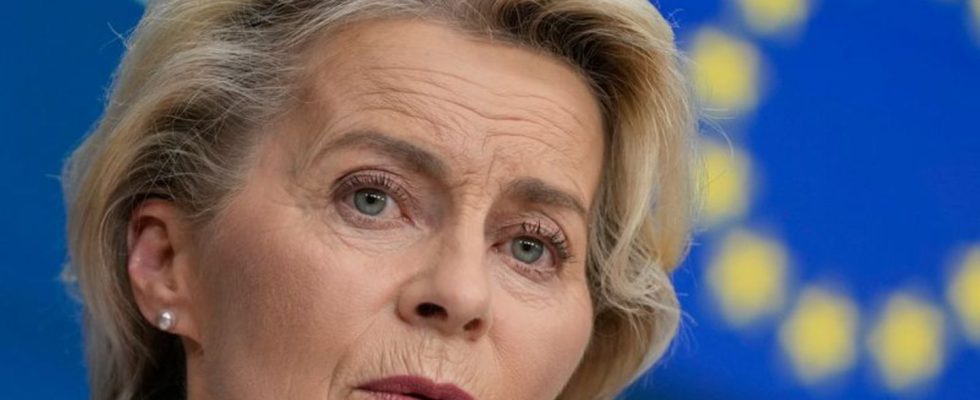Talks about EU enlargement
Von der Leyen visits Kiev
Ursula von der Leyen is in Ukraine for the sixth time. photo
© Virginia Mayo/AP/dpa
Is Ukraine ready for accession negotiations with the EU? The EU Commission will present a report on this next week. Beforehand, the boss takes another look at the situation on site.
EU Commission President Ursula von der Leyen has arrived in Ukraine for her sixth visit since the Russian attack over 20 months ago. There she wants to hold talks with President Volodymyr Zelensky about the country’s progress towards the future Lead the European Union. The visit had not been announced beforehand for security reasons.
The Ukrainian President received von der Leyen at the train station. Together they then awarded medals to railway employees.
Next Wednesday, von der Leyen will present reports on Ukraine’s reform progress in Brussels. On the basis of this, the heads of state and government of the European Union want to decide in December whether accession negotiations should start with the government in Kiev. The presentation of the reports is the reason for the trip.
Von der Leyen wants to bring “encouragement and encouragement.”
On the way to Kiev, the EU Commission President told journalists that she wanted to reassure Ukraine, which was attacked by Russia, “that we are firmly on their side” and give them “encouragement and encouragement.” In addition to the country’s desired accession to the EU, it will also include financial and military support as well as sanctions against Russia.
The Commission President and former Federal Defense Minister also pointed out the dangers of the journey. “Whenever I drive to Ukraine, there is of course a certain feeling of tension because it is a war zone.” As always, von der Leyen took a special train from Poland to Kiev. Flights over Ukraine are still not possible.
Candidate for EU membership since last summer
The country has been an official candidate for EU membership since last summer. However, the 27 EU states still have to unanimously decide on the start of negotiations. There should be a positive vote if Ukraine has met seven requirements. These include, for example, the selection process for Ukrainian constitutional judges and a stronger fight against corruption – especially at high levels. The EU also demands that standards in the fight against money laundering be adhered to and that a law against the excessive influence of oligarchs be implemented.
Probably not all the requirements for negotiations have been met yet
Commission circles recently said that Ukraine had made great progress, but that it would probably not yet be possible to fully assess all seven requirements as being met. It is therefore likely that the EU states will be recommended to decide to start accession negotiations, but to set the first negotiation date only after all reform requirements have been met.
In this way, the EU Commission would also accommodate all those EU states that are of the opinion that progress in the EU accession process should be completely performance-related. They argue that there could be great frustration, especially in the candidate countries in the Western Balkans, if the approach based on reform progress is now deviated for political reasons. They are opposed primarily by Central and Eastern European states that see the start of negotiations as a necessary geopolitical investment and argue that the hope of joining the EU is also a motivating factor in the fight against the Russian attackers.
Reforms should enable expansion
In principle, many in the EU are of the opinion that the admission of large countries like Ukraine can only be a success if there have been internal reforms beforehand. The decision-making processes in the area of foreign policy, for example, are already sometimes very cumbersome because the principle of unanimity generally applies.
In addition, Ukraine’s huge agricultural sector would probably make a comprehensive reform of EU agricultural subsidies necessary. EU experts recently calculated that without changes, EU funds totaling 186 billion euros would flow to Ukraine over a budget period of seven years.

